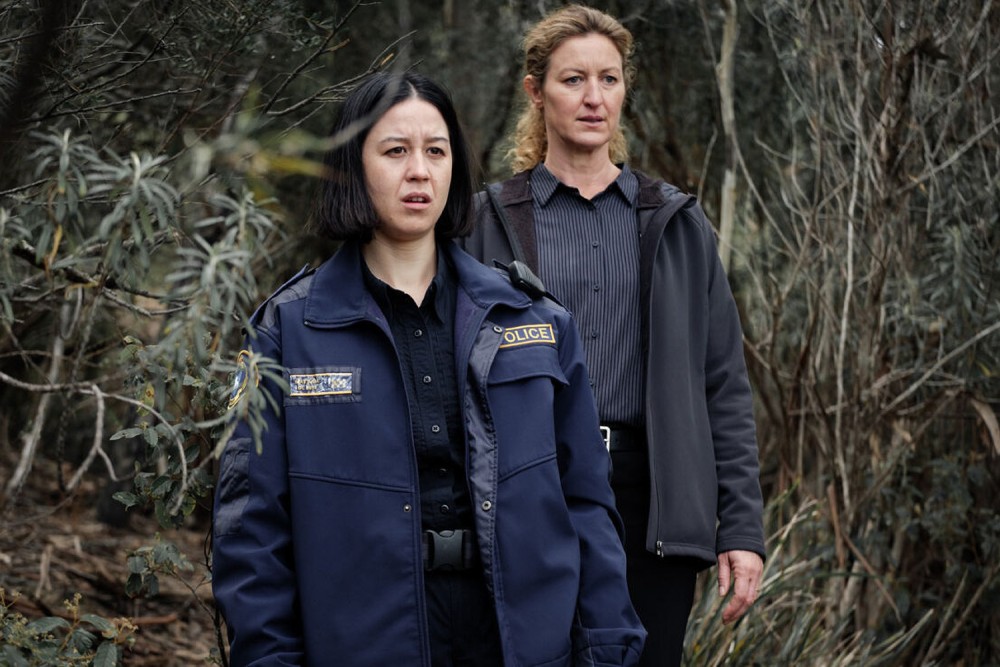The buddy-cop feminist detective series I didn’t know I needed
Deadloch is one of the funniest, smartest, most unexpected delights I have watched in a long time.

Nina Oyama (left) and Kate Box in Deadloch. (Prime Video)
I kept meaning to watch the new season of True Detective. I wasn’t a fan of the first season’s glamorized misogyny wrapped in sophomoric philosophical chatter, but this new season promised to right the wrongs of the past. Two women detectives solving a mysterious crime in the barren cold of an Alaskan winter, hints of a powerful divine feminine replacing the hopped-up toxic masculinity of the Southern gothic? Yes, please. Add in Jodie Foster—my first actor crush when I began to take movies seriously in high school—and it seemed tailor-made for me. But just looking at the promotion posters made me tired. I felt crushed beneath the weight of its self-seriousness before I even began. I never started.
It turns out everything I could ever have wanted from an odd-couple buddy-cop feminist detective mystery was waiting for me instead in a different series, Deadloch (created by Kate McCartney and Kate McLennan, streaming on Amazon Prime). The series opens with all the trappings of a serious crime drama: two teenage girls walk in the early morning dawn as a tiger snake slithers menacingly through the undergrowth. As they emerge on a deserted beach, one of the teenagers freezes in terror, staring down at a naked corpse. Ominous music swells. Then the other teenager trips in a hole, landing face-first inches from the corpse’s flaccid penis, her illicit cigarette flying from her mouth and lighting his pubic hair on fire. She begins beating his genitals with her beanie to put out the fire as her friend vomits near his head.
In this one minute, the show catapults over ponderous dread into something entirely of its own making. It’s one of the funniest, smartest, most unexpected delights I have watched in a long time.
Deadloch is a small, fictional town in Tasmania where crime rarely rises above a drunken fight at the pub or teenage pranks in the local graveyard. But murder has a way of testing any community, and it doesn’t take long for the cracks to appear. The long-term residents are mostly White working-class people who are obsessed with soccer and nursing the wounds of economic downturn. They feel displaced by a new crop of land-loving, arts-seeking lesbians who have migrated through word of mouth until they form a sizable gentrifying presence. Both groups are perpetuating decades of displacement of the Aboriginal communities who also still live in and around the town. A toxic mix of resentment, suspicion, and misunderstanding has been simmering for a long time.
When an abrasive detective from the mainland, Eddie Redcliffe (Madeleine Sami), is sent to assist local senior sergeant Dulcie Collins (Kate Box) on the case, the town’s buried skeletons—literal and metaphorical—rise to the surface. And almost as quickly, the body count rises too.
Much of the show’s humor hangs on this unlikely partnership, a staple of the detective genre. Eddie, the big-city cop who can’t believe she’s been assigned this backwater, bulldozes Dulcie and the local team, leaping to improbable scenarios (“the Dead Cunt Football Drug Ring!”) to force a conclusion as fast as possible. She swaggers and badgers and insults her way through the town, spewing a torrent of filthy, hilarious commentary. Dulcie plays a restrained straight man to Eddie’s wild buffoonery, throwing herself into her work to avoid marital troubles at home. Both are hiding wounds and secrets that interfere with their work, until they finally find their balance in each other.
The victims are all heterosexual White men, who are poisoned before their tongues are cut out and they are strangled to death, the symbolism of which is driven home as we watch one male character after another talk over and belittle the women in their lives. The town may not have a lot of experience with public violent crimes, but they have excelled in the domestic variety for quite a while. Seizing on their new position as targets for the serial killer, the men begin to demand protection for their victim status. Under pressure from the old boy network, the police commissioner actively interferes in the case, as Dulcie and Eddie race against the clock and their own police force to solve the crime before the murderer strikes again.
Somehow the show manages to hit every beat of the prestige crime drama, creating a nail-biting whodunit while skewering the genre at the same time. The satire is aimed squarely at shows like True Detective (and Broadchurch, and Top of the Lake, Mare of Easttown, The Killing, The Fall, The Sinner, The Bridge, and too many more to name) that use the torture and death of women (or sometimes children) as the backdrop for vague social commentary or to probe the wounded inner lives of the detectives. The bloody trail of women’s bodies is taken as a social fact about which nothing can be done. The idea that gendered violence is unpreventable appears bluntly, and hilariously, nonsensical once all the victims are straight White men and the prime suspects are gentrifying lesbians and the local abused wives and mothers.
Even more often, the detectives in these shows become suffering heroes who pay a great price for witnessing evil they are incapable of preventing. Eddie and Dulcie aren’t having it. Hindered at every turn by incompetent sexism—“He told me I was ruled by the moon and hysterical,” Dulcie says after a conversation with the police commissioner, “so that’s nice to know he’s in our corner”—they shake off misdirection and melodramatic nonsense, laser focused on solving the case. It wasn’t until I was laughing so hard I nearly fell off my couch that I realized how weary I had grown of the self-serious detective genre—and why I never got around to starting True Detective. But I could watch Eddie and Dulcie solve crimes all day.




